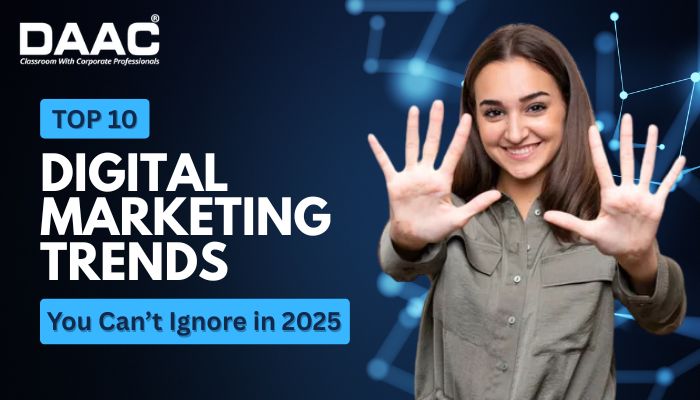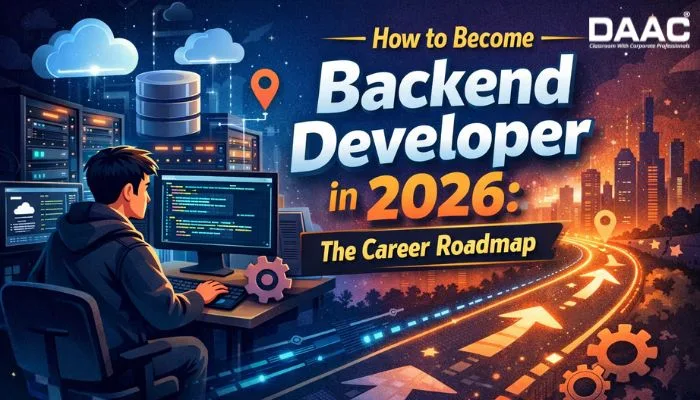Key Takeaways
- The trends in digital marketing in 2025 will mostly be influenced by personalization and automation powered by Artificial Intelligence.
- The shift to video-first and voice search search optimization will continue to take priority when interacting with consumers.
- Brands that prioritize sustainability, privacy, and authenticity will foster long-term loyalty, and personalization for the consumer.
- The metaverse, social commerce, and omnichannel marketing will continue to influence the digital ecosystem.
Market Analysis: Global Digital Marketing Courses (2025)
- The global digital marketing education market is predicted to exceed USD 35 billion by 2025, with an estimated CAGR of 13-15%.
- Markets with the highest levels of saturation, North America and Asia-Pacific, have turned demand towards online and certified programs.
- Data analytics, social media channel marketing, search engine optimization (SEO), and artificial intelligence (AI)-based advertising are a few examples of courses that fall within digital marketing education.
- Corporate or industry-based retraining in digital marketing education has been facilitated by corporate partnerships with online learning platforms (Coursera, Udemy, Google Digital Garage).
- Millennials and Generation Z account for 65% of course enrollments and indicate a significant generational shift in the workforce towards technology-dependent jobs.
- Interest in automation and artificial intelligence-based courses has risen over 40%.
What is Digital Marketing
Digital Marketing Trends: Digital marketing is the act of using digital platforms and digital technology to promote products, services, or brands online in order to attract new customers. Digital marketing is a modern marketing method of identifying target audiences and engaging with them in an effective manner while utilizing the internet, mobile devices, social media, search engines, and other digital media. Businesses today must be knowledgeable about the latest strategies for online marketing to stay competitive and establish a favorable online presence by 2025.
5 Steps to Develop a Successful Digital Marketing Strategy
Step 1: Research the Market and Identify Trends
Step 2: Define Your Audience and Goals
Understanding your audience is the foundation of every successful strategy.
Segment users by demographics, interests, and online behavior to create highly targeted campaigns.
Then, set clear goals and measurable KPIs — such as engagement rate, conversions, website traffic, or ROI — to evaluate performance.
Step 3: Select the Right Digital Channels
Focus on the platforms where your target audience is most active:
- TikTok, Instagram Reels, or YouTube Shorts for short-form videos
- LinkedIn and blogs for B2B marketing
- Email and push notifications for personalized outreach
- Choosing the right channel ensures your message reaches the right audience at the right time.
Step 4: Create Trend-Driven, High-Quality Content
Content is the backbone of digital marketing. Develop creative and engaging content using:
- AI personalization for tailored recommendations
- Interactive and immersive formats (AR/VR) for better engagement
- Short-form storytelling and user-generated content (UGC) for authenticity Ensure every piece of content is SEO-optimized, mobile-friendly, and relevant to maximize reach and conversions.
Step 5: Automate, Analyze, and Adapt
Leverage AI, analytics, and automation to enhance your marketing efficiency.
Use tools for:
- Campaign automation (emails, social media posts)
- CRM integration for customer tracking
- Chatbots for instant engagement
- Continuously evaluate and optimize your strategy through A/B testing and performance data. Stay adaptable to new trends and technologies to maintain long-term success.
Types of Digital Marketing
In an ever-changing digital landscape, it is crucial that companies embrace the leading digital marketing strategies to remain competitive. The following five types of digital marketing are driving the newest online marketing approaches and indicating the future of digital marketing.
- Search Engine Optimization (SEO): SEO, or search engine optimization, is the action you take to improve a website’s friendliness to search engines and is arguably one of the best long-term strategies to increase online visibility. Search algorithms have evolved quickly due to AI and user intent and content quality are more important than ever. As a result, SEO is certainly one of the digital marketing strategies you will want to pay attention to in 2025 and beyond.
- Content Marketing: Content remains vitally important. Engaging, valuable and informative content is an effective tool for attracting customers and retaining customers. Some of the newest trends in online marketing strategies being employed by some of the leading brands include video blogs (vlogs), podcasts, and interactivity, in addition to content of course. Personalized content and AI-generated content are also playing a critical role in the future of digital marketing.
- Social Media Marketing: You can still develop a brand and connect with users in 2025, based on enhancing a marketing strategy on social media platforms such as Facebook, Instagram, LinkedIn, and TikTok. Marketing strategies that illustrate the shift toward community content and micro-influencers are still in use in digital marketing and most likely will find their way in the future. The other primary component of the future of digital marketing is social commerce, or the capability to purchase directly from social media.
- Email Marketing: Email marketing is evolving along with automation, segmentation, and AI personalization, even as it remains one of the first digital marketing channels. Some of the best digital marketing practices to look out for in order to promote customer retention and conversion involve advanced email campaigns tailored to the behavior of the user.
- Pay-Per-Click (PPC) Advertising: PPC includes Google Ads, display ads, and ads on social media where companies pay based on click-through. Whether you are targeting or retargeting, PPC continues to be leading-edge in online marketing and driving immediate results. AI and machine learning will continue to permeate and evolve the existing online marketing ecosystem.
Top 10 Digital Marketing Trends in 2025
- Personalized Experiences Supported by AI: The age of artificial intelligence, or AI, has changed the game in digital marketing by enabling hyper-personalization of experiences for consumers. Marketers are now using AI to assess consumer behavior, make predictions about preferences, and deliver tailored content and recommendations in real time back to consumers. This change has positive implications for engagement marketing and conversion rates.
- Optimizing for Voice & Visual Search: With the rise of voice assistants and visual search tools, and where voice and image based search will become commonplace for consumers, brands need their content to be optimized for voice based and image based searches. Brands are now using conversational keywords technologies as well as image classification technologies to enhance search visibility; both positively impacting user experience.
- Rise of Social Commerce: Social media channels have effectively become a shopping destination with users now able to buy products via social posts and on ads. This is known as social commerce and is changing the way consumers discover and purchase products where the shopping experience is more closely integrated and seamless.
- Short-Form Video Proliferation: The majority of the content is coming from TikTok, Instagram Reels, and YouTube Shorts. Brands have capitalized on this trend with high-quality short form video content that draws attention, enhances engagement, and builds brand awareness, especially among the younger generation.
- Maturation of Influencer Marketing: Influencer marketing is alive and well, but brands are focusing on micro and nano-influencers who can create more authentic and permeable relationships with their audience. Brands are engaging micro and nano-influencers to instill trust and academic conversion of audience members into a much more niche community.
- Data Privacy and Ethical Marketing: As consumers are becoming more cognizant of data privacy, brands are putting an emphasis on transparency and ethical marketing and advertising. Brands must adhere to data privacy legislation and be transparent with their consumers on how their data will be used to develop trust and maintain audience loyalty.
- Augmented Reality (AR) Experiences: The AR technology is enhancing customer experiences since customers have the ability to interact with the products digitally. Brands are utilizing AR in their marketing strategies to enhance the marketing experience and brand awareness, engaging customers in a more immersive experience, through virtual try-ons, or interactive product demonstrations.
- Sustainability and Purpose-Driven Branding: Consumers are increasingly looking for brands that have similar values, specifically with sustainability and socially responsible branding. Therefore, brands are strategically creating purpose-driven branding to connect with conscious consumers as well as stand out in an increasingly competitive marketplace.
- Omnichannel Marketing Integration: It is increasingly important for developers to create a seamless and cohesive experience for customers, for every single touchpoint, online and offline. Therefore, brands are integrating their marketing efforts across multiple channels to create a more cohesive experience and journey for customers, ultimately leading to improved customer satisfaction and loyalty.
- Interactive and Immersive Content: Interactive content that increases participation from users, regardless of type, (polls, quizzes, gamified experiences, etc.) remains wildly popular and continues its success in the current world. brands are certainly experimenting with interactive content in order to increase engagements, valuable data collection points, and in order to create memorable experiences.
Feature of Digital Marketing
- Social Media Marketing: Social media marketing centers on promoting products or services through different social media platforms like Facebook, Instagram, LinkedIn, and Twitter. Businesses can promote their message or company through posts, stories, reels, and ads. Social media is a great way to build brand awareness, improve community, and promote leads or sales at the bottom of the sales funnel.
- Email Marketing: Email marketing refers to sending campaigns with the intent to target your audience either to inform, nurture or convert them. Email marketing can be used in newsletters, promotional offers, and automated workflows. Email marketing can be a direct opportunity to communicate to your customers, improve customer loyalty, and improve repeat purchases.
- Pay-Per-Click (PPC) Advertising: PPC advertising enables businesses to launch ads that they will pay for through the use of search engines or social media, among other places. Depending on their spend, businesses are provided with immediate visibility as well as an optimum chance to target specific audiences, while also taking advantage of measurable ROI versus organic “free” traffic. Another key benefit of PPC advertising is that businesses can modify their ad preferences based on the amount of clicks, impressions, and conversions.
- Video Marketing: Video is the best modality to earn a brand message given its universality in distribution and viewing. Video marketing employs the use of platforms such as YouTube, social media, or a company’s website. Some examples of how a video can be produced include demonstration of a product, storytelling, educational content, and the ability to create engagement, which oftentimes leads to an increase in the conversion rate.
- Mobile Marketing: Mobile marketing targets users through mobile applications, push notifications, SMS campaigns, and in-app advertising. This allows brands to connect with audiences at anytime from anywhere, creating more access and convenience for users accessing them from their mobile device.
How to Make Money from Digital Marketing Trends
- Offer Freelance Digital Marketing Services: Organizations always need experts in the latest online marketing techniques like SEO, PPC, social media marketing, and content creation. If you offer freelance work, you can help organizations grow their brand online and charge a fee for the service. If you stick with it, you’ll then have experience and a portfolio of case studies that will allow you to have a good income.
- Launch Your Own Online Business or E-commerce Store:The application of digital marketing strategies is a viable means to increase traffic and promote and sell products pertaining to your own business. Content marketing, email automation, social media platforms for advertising, and the assistance of influencers are all effective and productive methodologies to increase visibility and achieve a positive return on investment (ROI).
- Monetize a Blog or YouTube Channel: Creating valuable content and engaging an audience can lead to income from advertising revenue, sponsored posts, or promotions. Using current research regarding the future of digital marketing, you can create future content that utilizes trending keywords, attention-grabbing video formats, and SEO best practices to increase your affordable audience, and cash in more revenue.
- Offer Online Courses or Digital Products: If you possess expertise, knowledge, and experience in fields such as SEO, social media marketing, or content, you might begin selling digital marketing courses or eBooks to earn income. Many individuals and businesses will be pleased to pay for your expertise level of expertise, thus this could be a way to scale your income.
- Use Social Media Marketing for Client Acquisition: By employing effective techniques in digital marketing, you can provide for a business in terms of expanding their social media following. You can manage the campaigns, design the advertisements, and ultimately optimize the engagement and offer it as a service for profit.
Conclusion on 10 Digital Marketing Trends
The field of digital marketing will enter an era of AI-powered, personalized experiences, a video-first mindset, and an omnichannel approach. Companies that embrace sustainability, transparency, and the privacy of consumers will help build trust and, consequently, create a competitive advantage. Engagement and discovery channels will move toward automation, AR/VR, and voice search, and even with that shift to evolving media, brands will still need to be engaged and creative to break through the peripheral distractions of the digital marketplace. Join DAAC’s digital marketing course in Jaipurto gain hands-on experience in SEO, Google Ads, social media, and more. Start your marketing career today!
FAQs About Digital Marketing Trends in 2025
- What will be the most notable digital marketing trends in 2025?
AI-driven personalization, video-first content, voice search optimization, social commerce, and sustainability-focused branding are the key digital marketing trends driving 2025.
- Why is video marketing crucial in 2025?
Short-form videos on platforms such as YouTube Shorts, TikTok, and Instagram Reels are likely to dominate user engagement thus making video an important medium for communicating storytelling and brand recognition in the digital channels.
- Will small businesses be able to take advantage of digital marketing trends?
Absolutely. Small businesses can capitalize on the more affordable digital options for marketing such as social media marketing, SEO strategies, and influencer partnerships, that can be scaled to reach larger audiences and grow sustainable businesses.




